by Milt Nuzum, Director, Supreme Court of Ohio Judicial College
 Some NASJE members have had significant experience in the international judicial community by practicing their profession of judicial and court personnel education in developing nations. Many others are interested in learning more about opportunities that exist to contribute their skills to judicial systems around the globe. The reasons for NASJE members to have interest in these opportunities might be as diverse as the individuals who belong to our organization. However, NASJE member and former president, Tom Langhorne, summarized it well when he said, “The most life changing rewards I have ever experienced have come through international work. It causes you to critically examine and challenge some of your long held values.” NASJE member and former president William Brunson agreed with Tom and contends that there is very little downside to international work. As he put it, “Consulting in developing nations is an enriching life experience.”
Some NASJE members have had significant experience in the international judicial community by practicing their profession of judicial and court personnel education in developing nations. Many others are interested in learning more about opportunities that exist to contribute their skills to judicial systems around the globe. The reasons for NASJE members to have interest in these opportunities might be as diverse as the individuals who belong to our organization. However, NASJE member and former president, Tom Langhorne, summarized it well when he said, “The most life changing rewards I have ever experienced have come through international work. It causes you to critically examine and challenge some of your long held values.” NASJE member and former president William Brunson agreed with Tom and contends that there is very little downside to international work. As he put it, “Consulting in developing nations is an enriching life experience.”
How can I get started with international judicial education experience?
William Brunson suggests that a good first step, if one has never had exposure to the international judicial education experience, is to become involved in the International Visitor Leadership Program. This program is run by the U. S. Department of State. It brings international visitors to the United States to promote mutual understanding between the U.S. and other nations around the world. These visitors come to our local communities to interact with leaders in many professions including our own. If interested, one can learn about these opportunities through the National Council for International Visitors.
Another opportunity exists to network with judicial education experts from around the world through the International Organization of Judicial Training (IOJT). This organization was formed in 2002. It holds biennial conferences for judicial educators. The last conference was held in Sydney, Australia in 2009. The 2011 conference will be held this fall in Bordeaux, France. The conferences have rich agendas with ample opportunity to meet colleagues from countries on every continent. IOJT only accepts organizational memberships. State judicial education organizations qualify for free memberships in IOJT. Staff members of state organizations that belong to IOJT may participate in IOJT conferences and activities.
Where do international consulting opportunities originate?
Most opportunities arise through programs initiated by the United States Agency for International Development. It is a federal agency charged with implementing policies of the U.S. State Department. Most USAID money is distributed through very large contracts given to a rather small group of companies and organizations designated prime contractors. These prime contractors engage subject matter experts to deliver the services called upon in the scope of services of the prime contract. The subject matter experts are subcontractors with the prime contractors. The prime contractors often seek exclusive agreements with subcontractors. They often use the credentials of their subcontracted experts to their advantage when bidding on the prime contract. If you are locked into such an agreement, and your prime contractor was unsuccessful in its bid to get the prime contract, your ability to apply to the entity that was actually awarded the contract is precluded. Accordingly, it may be to a judicial educator’s advantage to remain non-exclusive.
USAID projects are multifaceted focused on many things including among others, disaster relief, poverty relief, and rule of law projects. USAID funds projects in 17 countries in Latin America, 21 out of 50 countries in Europe, 22 out of 53 countries in Asia, an all 47 countries in Africa. Most judicial educators would find themselves engaged in those projects categorized as ‘rule of law’. One prime contractor, Tetra Tech DPKTetra Tech DPK , described ‘rule of law’ projects on its website as “[cembodying] the basic principles of equal treatment of all people before the law, fairness, and effective guarantees of human rights.
There are many companies and organizations that bid on prime contracts under the auspices of USAID. While the list below is not exhaustive, it illustrates many of the major players who would utilize the services of judicial educators on short term or long term subcontract agreements. These companies have websites that describe their projects and opportunities for employment or expense paid short term volunteer assignments. The websites provide ample information on how to apply and become a consultant.
What skills do you need to become a subcontractor for a USAID project?
According to William Brunson, foreign language speaking skills are not always necessary. English is often sufficient as it is becoming an international language. It helps if you have the skill to speak a second language and it is particularly helpful if you speak the native language of the country to which you would potentially be assigned to serve. Of course the contractors vet for subject matter expertise. Those who have experience as judges, court administrators, court security specialists, and judicial educators are sought after for many assignments. Formal education and years of experience also weigh in decision making about who might be qualified for a particular assignment. Paid assignments have pays scales weighted on these factors with Ph.D. and J.D. often attracting higher salary offers than other degreed applicants.
What should you consider if you wish to apply for a position?
Tom Langhorne offered this practical advice. He said, “Know yourself and your skill set. Accentuate your skills in your application. Don’t try to be all things to all people. Play to your strengths.” He also suggests that you research the country to which you are asking to be assigned before you apply. The countries being served often have challenging conditions in their culture and environment that can cause a person who is unprepared to have a less than pleasant experience.
Will I be safe?
While danger can lurk around the corner even in the U.S., the international assignments are made with safeguards built in to minimize risk. The U.S. State Department offers a great deal of information to prepare you for an assignment and offers practical advice on how to protect yourself from violence if you leave U.S. protected areas.
Another thing to consider is the endemic diseases that affect many areas of the world. You should assure that your inoculations are up-to-date. Tom Langhorne advised that you make certain your health insurance coverage will be effective in a foreign nation and that you purchase extraction insurance in case you must leave your assignment for some unexpected reason.
William Brunson offered the observation that the comforts of home are often not available in these assignments. Travel and mail can be problematic. Access to Internet is spotty in some areas. While these are inconveniences, the positive life experience of living and contributing to an emerging society in his opinion far outweigh the inconveniences.


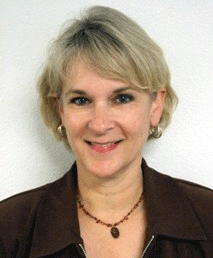
 Following a four-month nationwide search, NCJFCJ President Judge R. Michael Key, with the advice and consent of the NCJFCJ Board of Trustees, selected Ms. Bickett, who assumed her duties April 1, 2011. In making the announcement Judge Key said, “We had some very highly qualified candidates and we chose Mari Kay from among them for a reason. She has a stellar 23-year record in judicial education at the state and national level. Our goal from the beginning was to select someone that we would be excited to present to our membership and our partner agencies, and we have accomplished that goal.”
Following a four-month nationwide search, NCJFCJ President Judge R. Michael Key, with the advice and consent of the NCJFCJ Board of Trustees, selected Ms. Bickett, who assumed her duties April 1, 2011. In making the announcement Judge Key said, “We had some very highly qualified candidates and we chose Mari Kay from among them for a reason. She has a stellar 23-year record in judicial education at the state and national level. Our goal from the beginning was to select someone that we would be excited to present to our membership and our partner agencies, and we have accomplished that goal.”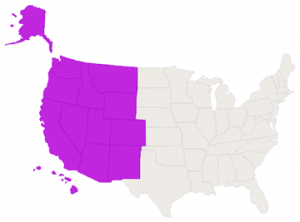
 Please join us in welcoming the following new NASJE members:
Please join us in welcoming the following new NASJE members: Some NASJE members have had significant experience in the international judicial community by practicing their profession of judicial and court personnel education in developing nations. Many others are interested in learning more about opportunities that exist to contribute their skills to judicial systems around the globe. The reasons for NASJE members to have interest in these opportunities might be as diverse as the individuals who belong to our organization. However, NASJE member and former president, Tom Langhorne, summarized it well when he said, “The most life changing rewards I have ever experienced have come through international work. It causes you to critically examine and challenge some of your long held values.” NASJE member and former president William Brunson agreed with Tom and contends that there is very little downside to international work. As he put it, “Consulting in developing nations is an enriching life experience.”
Some NASJE members have had significant experience in the international judicial community by practicing their profession of judicial and court personnel education in developing nations. Many others are interested in learning more about opportunities that exist to contribute their skills to judicial systems around the globe. The reasons for NASJE members to have interest in these opportunities might be as diverse as the individuals who belong to our organization. However, NASJE member and former president, Tom Langhorne, summarized it well when he said, “The most life changing rewards I have ever experienced have come through international work. It causes you to critically examine and challenge some of your long held values.” NASJE member and former president William Brunson agreed with Tom and contends that there is very little downside to international work. As he put it, “Consulting in developing nations is an enriching life experience.”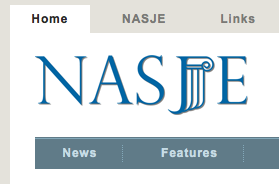 The new NASJE website is launched! As you can see, if you are a regular visitor, the NASJE website has been integrated into the NASJE News site.
The new NASJE website is launched! As you can see, if you are a regular visitor, the NASJE website has been integrated into the NASJE News site.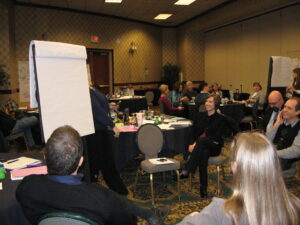 The National Council of Juvenile and Family Court Judges (NCJFCJ) was awarded the 2010 Juvenile Drug Court Training and Technical Assistance grant from the Office of Juvenile Justice Delinquency and Prevention this past October. NCJFCJ has been providing training and technical assistance to the juvenile drug court field since 1998 and this funding provides the opportunity to step back and look at the juvenile drug court field as a whole and determine how best to move the field forward. In order to begin envisioning the future of the field, NCJFCJ has formed a Project Advisory Committee (PAC) to serve as the driving force for training and curriculum development. Because, NCJFCJ’s vision for juvenile drug courts consists of a more holistic viewpoint, members from a wide array of systems were invited to participate in the meeting (i.e., researchers/evaluators, mental health, schools, substance abuse/use treatment, mentoring programs, screening/assessment, and juvenile justice).
The National Council of Juvenile and Family Court Judges (NCJFCJ) was awarded the 2010 Juvenile Drug Court Training and Technical Assistance grant from the Office of Juvenile Justice Delinquency and Prevention this past October. NCJFCJ has been providing training and technical assistance to the juvenile drug court field since 1998 and this funding provides the opportunity to step back and look at the juvenile drug court field as a whole and determine how best to move the field forward. In order to begin envisioning the future of the field, NCJFCJ has formed a Project Advisory Committee (PAC) to serve as the driving force for training and curriculum development. Because, NCJFCJ’s vision for juvenile drug courts consists of a more holistic viewpoint, members from a wide array of systems were invited to participate in the meeting (i.e., researchers/evaluators, mental health, schools, substance abuse/use treatment, mentoring programs, screening/assessment, and juvenile justice).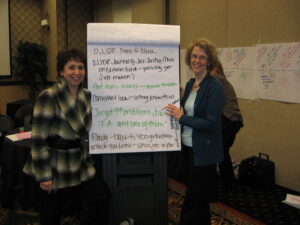 It was clear from the meeting that juvenile justice in general and juvenile drug courts will benefit greatly from current research on adolescent development, mental health and trauma, and substance abuse treatment. As this research continues, courts will have a greater understanding of the underlying reasons that youth use and abuse substances, while also having more tools to appropriately address this behavior. NCJFCJ is planning to create training and technical assistance tools for juvenile drug courts to incorporate research into their day-to-day practices.
It was clear from the meeting that juvenile justice in general and juvenile drug courts will benefit greatly from current research on adolescent development, mental health and trauma, and substance abuse treatment. As this research continues, courts will have a greater understanding of the underlying reasons that youth use and abuse substances, while also having more tools to appropriately address this behavior. NCJFCJ is planning to create training and technical assistance tools for juvenile drug courts to incorporate research into their day-to-day practices.